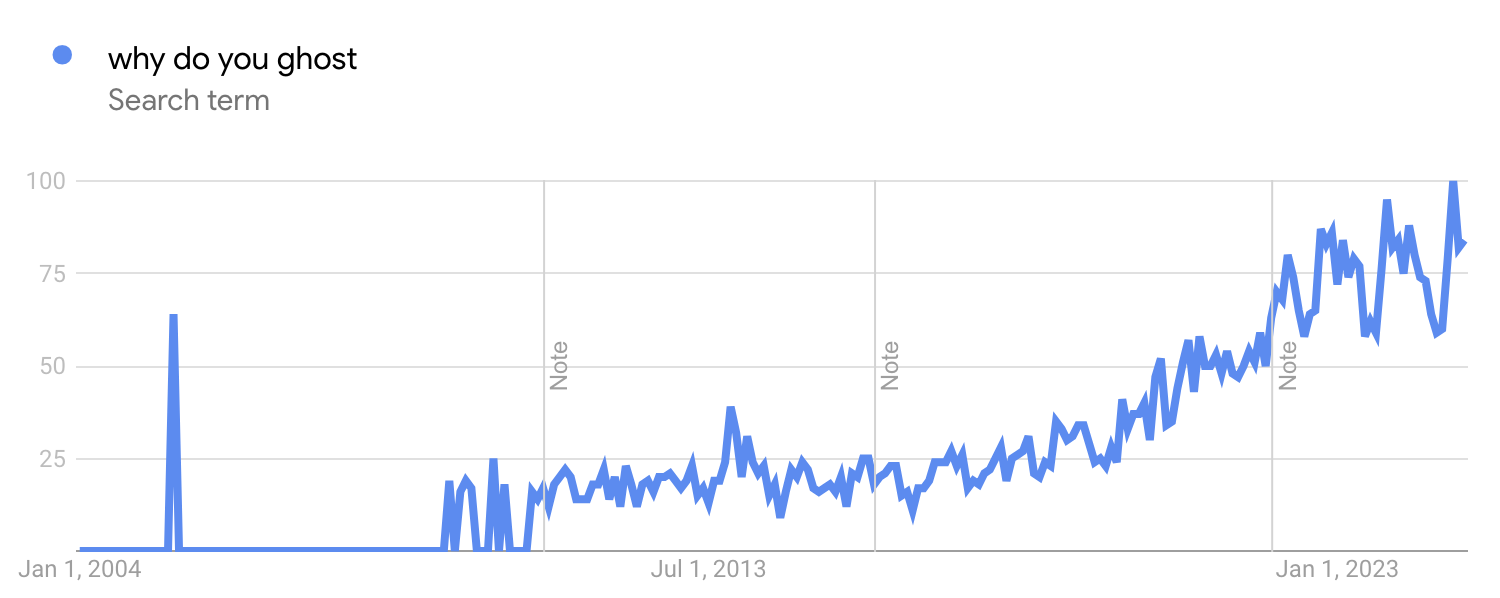Why Do You Ghost?
Getting ghosted sucks. It happens so often in the internet world, and it gives you that terrible feeling of rejection and loneliness when you're on the receiving end of it.
What Is Ghosting and How Did It Become Common?
I did a quick Google Trends search on “Why do you ghost,” and it is discouraging:

Merriam-Webster dictionary traces the first use of the term ‘ghosting’ in 2006 and defines it as “the phenomenon of leaving a relationship of some kind by abruptly ending all contact with the other person, and especially electronic contact, like texts, emails, and chats.” A quick Wikipedia search shows that the use of the term got popularized in 2015 through many articles on high-profile celebrity relationships.
Although ‘ghosting’ has its origin in celebrity gossips, it has become widespread with our increased exposure to social media and online interactions.
The Paradox of Ghosting Among the Lonely
From my experience, online world is rife with ghosting. I got ghosted even by people who sought my friendship and whom I talked to regularly about their loneliness. I thought it was paradoxical — if you are so lonely, why do you ghost?
Naturally, I went on Reddit to see what people had to say about that.
This one post I came across went,
Why Do People Ghost?
Anxiety and Insecurity
A couple of commenters said that they ghost due to their anxiety and insecurity. One person wrote,
Another commenter shared the fear of being found out that they're boring:
This is a self-fulfilling prophecy that sets themselves up for failure. If a soccer player never made a shot for the fear of missing the goal box, they will never score a goal.
Disillusionment with Internet Friendships
I found a more relatable answer for why people would ghost. One person said that internet connections are like empty calories if they never meet up in person and that's why they ghost. They went,
I deeply resonate with this comment. Internet friendship by itself feels extremely tenuous. Especially with text-based chats, talking to someone does not feel much different from talking to an intelligent chatbot. I think it is human nature to crave the physical interaction and to feel the warmth of human connection — vital element in combating feelings of loneliness.
Bridging the Gap Between Online and Offline Connection
Ultimately, people need to meet in real life. How do you get them to bridge the gap when so much of their lives are spent online? You have to meet them where they are and provide them the tools and opportunities that make transitioning from digital to in-person interactions seamless and natural.
What Would an Ideal Platform Look Like?
An ideal platform would help people form friendships online with the ultimate goal of meeting in person. While meetup apps like Meetup focus solely on organizing in-person events, they don’t nurture the initial bonds needed to make those meetings comfortable or exciting. Apps like Bumble BFF come closer, but they have failed to find traction which I think is because their swiping-based interface feels too similar to dating apps. I get that superficial qualities matter a lot for dating, but do they have that much weight for friendship? It feels awkward to swipe left and right on who I want as my buddy.
Currently, there’s no widely adopted app that fully bridges the gap between online friendship and real-life connection. Bubblic is my attempt to fill this void — a space where people can connect through voice, build meaningful relationships, and perhaps eventually meet in person, but I think it is still too early to tell.
Addressing Loneliness at a Larger Scale
With feelings of loneliness on the rise, I think there needs to be more resources deployed to tackle this issue. Both the private and public sectors have a role to play in fostering genuine human connections — from online to the real world.
